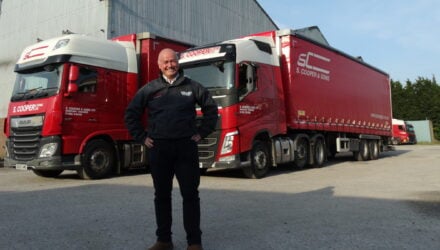Petrol and diesel-powered light commercial vehicles (LCVs) are being worked more than twice as hard as electric vans within the same customer fleets, despite the average daily mileage being well within the range of an electric LCV.
Detailed analysis of more than 85,000 vehicle records by MICHELIN Connected Fleet’s data science team found the average internal combustion engined (ICE) van travels 63 miles per day, compared with just 28 miles for an electric LCV.
MICHELIN Connected Fleet also found that 59 per cent of electric vehicles (EVs) are being plugged in when the state of charge is greater than 50 per cent – which negatively impacts driver productivity, particularly given half of charging events occur during the daytime. This overcharging is also putting lithium-ion batteries through unnecessary charging cycles which could cause them to deteriorate faster, negatively impacting range and residuals.
Alberto De Monte, Business Segment Director for EV and OEM at MICHELIN Connected Fleet, says: “Range anxiety is clearly impacting the fleet market’s confidence in electric vans, resulting in EVs being overcharged, and under-worked.
“In most applications the EVs you buy today have the range to do the job of a petrol or diesel-powered van in and around cities, but they’re being deployed on the lightest duty work – whilst ICE assets are being worked harder, which is less efficient and increases emissions.”
MICHELIN Connected Fleet’s analysis has also revealed that van drivers charged batteries to 90 per cent or more in 76 per cent of the charging events it studied – in comparison with car drivers who hit 90 per cent or more in only 58 per cent of instances.
De Monte adds: “We know lithium-ion batteries perform best when the state of charge is maintained between 20 to 80 per cent, and the general advice is to only charge the battery fully if you need that additional range for a particularly long journey.
“What we’re seeing points to more guidance being needed for fleets to ensure they are maximising the benefits which transitioning to EVs offer; and not storing up issues which could impact performance and residuals down the line.”
MICHELIN Connected Fleet offers a dedicated electric vehicle fleet management service called MoveElectric, designed to help businesses of all sizes to lower fleet CO2 emissions, reduce operating costs, and to integrate EVs for the most efficient last mile delivery strategy.
MoveElectric brings easy-to-use tools to help fleets plan, grow and master all aspects of EV fleet management, from identifying routes to achieving EV roll-out. It forms part of a comprehensive fleet management solution to help connect vehicles, optimise performance, and gain greater visibility across an entire fleet based upon informed data-driven choices.
MICHELIN Connected Fleet will be using its attendance at this week’s London EV Show 2022 (29 November – 1 December 2022, ExCel London) to talk to fleets about the importance of switching to EVs, and showcasing how MoveElectric can support the transition.




















